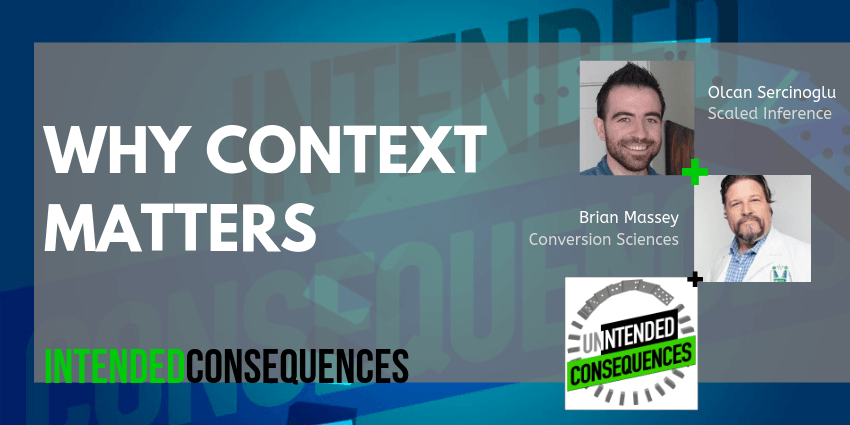From Segmentation to Contextualization: The New Way to Look at Marketing (Podcast)
Let’s dive into a brand new online marketing concept: Contextualization. Thanks to AI and ML, we have come a long way from creating customer segments. To improve conversions, we also need to understand context. Read on.
I predicted years ago that my business would be using machine learning for much of what we do manually today.
When I talk to people like Olcan Sercinoglu, I know that day is coming. Olcan is the CEO at a company called Scale Inference. He studied and worked under Peter Norton from Google – the guys who wrote the book on Machine Learning – and has spent the last 25 years as a developer engineer. Scaled Inference focuses on applying machine learning to online user interactions, and to personalize their experiences in ways we could never do by ourselves..
If we can understand how machine learning is different, we can understand how our digital marketing will be changed in the near future.
And so my interest was, “OK, this is great, but how do we how do we build a platform that is useful to others?”
From Segmentation to Contextualization: The New Way to Look at Marketing Key Takeaways
- Moore’s Law. Back in 1965, Gordon Moore predicted that we’d be able to fit twice as many transistors on a microchip every year. We are experiencing a golden age of tools – the tools are getting better, less expensive and getting easier to use.
- The future of AI marketing. Is it all about personalization? Are the metrics you’re optimizing for clear? And if not, can AI even work for you? Or how do we take all this data and make it matter?
- Contextualization. We are taking this idea of personalization and introducing you to a new term – contextualization. Everything you do as a marketer should flow from optimization. By understanding the metric first, then you can ideate and create based on the context that’s being emerged from the data.
How do we use AI to make us better marketers?

AI Optimization-Why context matters with Olcan Sercinoglu
But at the end of the day or what companies actually want out of that saying there hasn’t been much progress. I think a lot of progress is going to happen as machine learning shifts towards metrics and these easier modes of integration.
Moore’s Law: As Valid Today as it was a Few Decades Ago
In 1965, a man named Gordon Moore made a bold prediction, a prediction that was expected to fail almost every year since. It is a prediction that helps to explain the dizzying speed with which our lives are being upended by new tech..
What Moore said in 1965 is that we’d be able to fit two times more transistors on a microchip every year, year after year. What this meant for the semiconductor industry is that microchips would get twice as fast and cost half as much to produce every single year.
This, they thought, was crazy talk.
Every few years, the skeptics declared that we had reached the end of our ability to shrink these tiny transistors any more. “It’s just not physically possible,” they said.
And every time, Moore’s prediction was proven more or less true.
Even today, as the wires that run across microchips approach the width of an atom, engineers find ways to make things half the size.
Do not miss: Can AI Marketing Tools Increase Your Website’s Conversion Rates?
Why should you care? As microchips shrink and drop in cost, so do the things we build with them. For example, the camera that is found in any laptop has a HD resolution and costs the manufacturer a few dollars. The cost of servers and storage space has plummeted as well. Hence, most of our computing and storage is done in the proverbial cloud.
All of this has created a golden age of technology — for consumers, for businesses, and especially for marketers. Entrepreneurs are using the cloud and cheap computing power to make digital marketing cheaper easier, and more predictable.
It is now more expensive to ignore the amazing data we can collect than it is to buckle down and put it to use.
While we’re sitting around wondering what to do with all of this data, entrepreneurs and engineers are using it teach machines to learn.
The Era of Neural Networks: Is the Future of AI marketing all about Personalization?
Neural networks are computer programs that work like human neurons. Like the human brain, they are designed to learn. Neural nets have been around for decades, but only in recent years have we had enough data to teach them anything useful.
Machine learning is lumped together with Artificial Intelligence, or AI, but it’s really much simpler than building an intelligent machine. If you have enough data, it’s relatively easy to teach a machine how to learn and to get insights from it.
In fact, machine learning is being used all around you and you probably don’t even know it.
In this episode, I am going to change the fundamental question you ask as a marketer. You will no longer ask, “Will this creative work for my audience?” You will ask, “Which people in my audience will this creative work for?”
And we’ll ask some more tactical questions.
- How do we pull meaningful things out of our data in a reasonable amount of time.
- So how do we understand the information that the machine pulls for us?
- Are you optimizing for the right things? And if not, can machine learning even work for you?
- How do we take all this data and make it matter?
- How do we as marketers, become better at using the tools and resources available to us in the age of Moore’s law?
I start the conversation, asking Olcan, “Is the future of AI marketing all about personalization?”
From Segmentation to Contextualization: Focus on the Context that Your Visitors Arrive In
My favorite take away from my conversation with Oljan Sercinoglu is that context matters.
There is one big context that you don’t need machine learning to address: It is the context of your mobile visitors.
You may say that your website is responsive, and that you’ve already addressed the smartphone context. But, you haven’t.
Do you want proof? Check your analytics. You’re smartphone conversion rates are probably a half or a quarter of your desktop sites, even with that responsive design. I know this without looking at your analytics.
Mobile visitors are coming in a completely different context than desktop visitors. They don’t need a shrunk down version of your website. They need a different website.
Fortunately, you don’t need a machine learning program to identify these visitors. You can start personalizing your mobile site to deal with this new context.
Try this as a contextualization exercise: Reduce the number of fields on the mobile forms, or eliminate the forms altogether. Replace them with click-to-call. If you have an eCommerce site, make “Add to Cart” secondary and build your mobile subscriber list. Email is the life’s blood of eCommerce.
If your website is generating millions of visits, you may want to consider putting that data to work for you. Not every business is ready for machine learning, but you don’t want to be the last business in your market to start using it.
When You Get Back to the Office
When you get back to the office, I recommend that you share this episode of Intended Consequences with someone else in your company. It’ll make you look smart and forward thinking.
If not I have a challenge for you.
Here’s my challenge to you this week – start to really think about how you define success. Answer the question, “I’ve done a great job because…” and fill in the blank. Answer this questions three ways. everything you do as marketer should flow from optimization.
Then ask, how do I measure each of those with data I’m collecting today. Once you’re clear that it’s the idea that by understanding the metrics, first then you can begin to prioritize your data gathering and create based on the context that’s being emerged from the data.
Alright scientists, that’s it for this week.
Resources and links discussed
- Follow Brian on Twitter – @bmassey
- Follow Olcan on Twitter – @Olcan
- Learn more about Scaled Inference
Olcan Sercinoglu | Why Context Matters
- A/B Testing Guide: The Proven 6-Step Process for Higher Conversions - January 29, 2025
- Creating a Landing Page that Converts: 6 Essential Elements [Infographic] - December 4, 2024
- Confirmation Bias: What It Is and How It’s Hurting Your Website Conversions - August 20, 2024
















Leave a Reply
Want to join the discussion?Feel free to contribute!